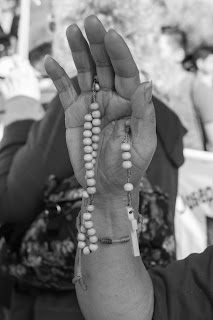 Thousands
of women marched on Jan. 21 to raise their voices for human rights. In
Washington, D.C. and across our nation, women came together in solidarity.
Thousands
of women marched on Jan. 21 to raise their voices for human rights. In
Washington, D.C. and across our nation, women came together in solidarity.  On
that same day, I marched in McAllen for my beliefs along with hundreds of
others in our community who joined the Diocese of Brownsville’s annual Pro-Life
March. Had I been in Washington, I would have marched in the Women’s March, but
not for all the reasons organizers of that particular event supported in their
platform.
On
that same day, I marched in McAllen for my beliefs along with hundreds of
others in our community who joined the Diocese of Brownsville’s annual Pro-Life
March. Had I been in Washington, I would have marched in the Women’s March, but
not for all the reasons organizers of that particular event supported in their
platform.
The
question for some on that day, as reported in the L.A. Times: “To march or
not?” The headline continued: “Some women are staying away from women’s rally
because of a rift over abortion.” Organizers decided not to include groups with
a pro-life stance as partners for the event. So it seems the Women’s March did
not aim to include all women’s voices.
“It’s
frustrating and insulting,” said Meg McDonnell, executive director of Women
Speak for Themselves, that you would claim to be inclusive and for human rights
and yet leave out women who are defending the rights of humans in the world.”
Helen
Alvaré, a law professor at George Mason University and founder of the Women
Speak for Themselves movement, also pointed out in a piece published on Crux, a
Catholic news site, the Women’s March raised a number of questions – questions
the media rarely pay attention to when it comes to what women “really want.”
The article is available at https://cruxnow.com/commentary/2017/01/17/womens-march-raises-questions-answers/
“I
realize that no one wants to organize a march called “The March for Some
Women’s Ideas, Some of which are Good, Some Vague, and Some Truly Terrible.”
But that would be a more fair characterization of the 2017 Women’s March.”
Moving
forward, I say given any opportunity, we should march. We should show up and
stand for our beliefs regardless of what the organizers try to set forth at the
dominant agenda. The Women’s March organizers showed their card by removing
pro-life groups from their list of partners, but we must not be bullied to the
sidelines.
All
women have the right to speak and uphold their convictions. No one can dictate
my beliefs or silence me. I am a pro-life feminist who promotes life at all
stages.
Closer
to home, the annual Pro-Life March in our Diocese is held in solidarity with
the national March for Life. Father Alex Flores emphasized it was a “peaceful
and prayerful march.”
This
year the national march was moved from Jan. 22 to Jan. 27. As we reported in
the January edition of our newspaper, it is held in reparation for the more
than 58.5 million babies who have been killed in the United States since
abortion became legal as a result of the Roe v. Wade Supreme Court decision on
Jan. 22, 1973.
Interesting
what the media pays attention to when they cover an event. Most reporters and
photographers in McAllen on Jan. 21 were not at the start or the finish of the
pro-life procession. They did not hear or report on the testimony of a father
who adopted a baby whose mother considered an abortion and opted instead to
give him life. They did not hear the songs of love, faith and hope of those who
witness to life. They hovered instead at the intersection near the abortion
clinic on Main Street and Houston. They wanted to see a confrontation as the
voices of those who support abortion tried to drown out the song and prayers of
the pro-life march.
Talking
to pro-life supporters who gathered at St. Joseph the Worker Church before the
procession, Bishop Daniel E. Flores acknowledged, “We are living in a country
right now where we see a lot of anger for a lot of different reasons.”
He
stressed, “We must be a people who do not let our anger move us, but we let our
love move us. Let us be the witness of a people who march through the street,
in a procession, singing praise to God, praying and asking God for the grace to
make this a world that is first of all hospitable to unborn life.
“As
we pray, pray for each other, for those whoever they are who may be
contemplating abortion, pray for those who are undecided, and pray for those
who are angry at us. One thing Jesus made very clear; we have no right as
Christians to answer anger with anger.”
How
can we expect peace in the world, if we cannot create it here in our
communities? As someone who is not comfortable with confrontation, with people
screaming in my face, I prefer to sit together and talk with one another. There
is no need to scream. I can hear you better when we dialogue. Let’s remember we
are brothers and sisters. We may have different views, be we can still love one
another and respect our differences. Bishop Flores reminds us, “Responding with
love triumphs with the grace of God.”
(Originally
published in February 2017 edition of The Valley Catholic newspaper)


